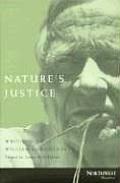
Imagine a current member of the U.S. Supreme Court propose that an old tree should have the right to sue to block a timber sale.
Or spending practically every recess visiting wild places around the globe.
Or taking the lead to preserve a roadless area in a national park and organizing a protest march to stop a highway through a greenbelt near Washington DC.
Or writing:
"[T]he despoilers are inside, as well as outside, government. It will take aroused public opinion and effective political action to keep the Pacific West from being ruined by the various invasions of 'civilization.'"
Once, such a justice existed and his name was William O. Douglas. He served on the Supreme Court from 1939 to 1975 and easily earned the distinction as the greenest justice in American history. He also hailed from the Pacific Northwest.
Better known for his controversial private life and liberal opinions from the bench, Douglas was also a passionate and eloquent nature writer that most conservationists under the age of 40 probably have never read. He wrote 30 books, hundreds of articles, and about a dozen of Douglas's books deal directly with his rich experiences in the outdoors. (Most are out of print, but I've seen many copies in used book stores and thrift shops, and libraries are full of his volumes.)
In Sierra magazine's list of classic "environmental literature" published in 2000, not one of Douglas's nature books made the cut! That's how far off the literary radar he is. Thoreau, Muir, Carson, and Leopold were better writers, but I would argue Douglas is the best quote machine when it comes to inspiring others to fight to protect the natural world or just enjoy being in nature. Try this one:
[T]o be whole and harmonious, man must also know the music of the beaches and the woods. He must find the thing of which he is only an infinitesimal part and nurture it and love it, if he is to live."
Douglas grew up in Eastern Washington where he contracted polio, survived, and restored his health by hiking in the foothills near Yakima. It was there he developed a life-long love for the outdoors, particularly the Pacific Northwest. Over the course of his lifetime, he seemingly camped in every county in the region.
 He moved east to attend law school as a young man and began a meteoric rise that saw him become head of the Securities and Exchange Commission, Supreme Court Justice, near running mate of FDR, passionate defender of civil liberties, one of the unsung pioneers of the modern conservation movement, and the writer of 30 books and hundreds of articles.
He moved east to attend law school as a young man and began a meteoric rise that saw him become head of the Securities and Exchange Commission, Supreme Court Justice, near running mate of FDR, passionate defender of civil liberties, one of the unsung pioneers of the modern conservation movement, and the writer of 30 books and hundreds of articles.
As a nature writer, Douglas is perhaps best known for Of Men and Mountains, his classic 1950 account of growing up in the Columbia Plateau country, and A Wilderness Bill of Rights, a stunningly forward-thinking manifesto published in 1965.
In A Wilderness Bill of Rights, Douglas bashes dam construction (before some of the ones on the Snake River were built), draining wetlands, destructive grazing and mining policies on public land, poisoning predators, and the indiscriminate application of pesticides (years before Congress banned DDT). He also called for the creation of an Office of Conservation to oversee federal and state efforts to protect the environment. Can you imagine where we would be today if that had gone through?
But my favorite Douglas nature book is 1960's My Wilderness: The Pacific West, a collection of essays about his favorite places in the region. I can honestly say reading it for the first time back in 1998 compelled me to buy a camper and explore over half the places Douglas profiled in the book, including the awesome Cape Alava area in Olympic National Park on the North Coast of Washington. This is the same place where long ago some politicians wanted Highway 101 to run. Douglas helped crush that officially insane idea for all time and the story continues to inspire me. Visit Pacific Beach and you'll know what I mean.
In 2000, Oregon State University Press published, Nature's Justice: The Writings of William O. Douglas, which excerpts much of Douglas's best material on the outdoors and conservation. This is a fine book, but naturally leaves out a lot. If you want to read all of Douglas on nature, and if you love this region you should, then hunt down his books. It's worth the effort.